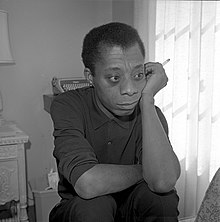
| Part of a series on |
| LGBT topics |
|---|
|
|
| Part of a series on |
| African Americans |
|---|
The African-American LGBT community, otherwise referred to as the Black American LGBT community, is part of the overall LGBT culture and overall African-American culture. The initialism LGBT stands for lesbian, gay, bisexual, and transgender.
A landmark event for the LGBT community, and the Black LGBT community in particular, was the Stonewall uprising in 1969, in New York City's Greenwich Village, where Black activists including Stormé DeLarverie (who instigated the uprising) and Marsha P. Johnson (who was in the vanguard of the later pushback against the police) played key roles in the events.
Following Stonewall, the 1996 legal precedent Romer v. Evans also had a major impact. Ruling in favor of Romer, Justice Kennedy asserted in the case commentary that Colorado's state constitutional amendment denying LGBT people protection from discrimination "bore no purpose other than to burden LGB persons".[2] Advancements in public policy, social discourse, and public knowledge have assisted in the progression and coming out of many Black LGBT individuals. Statistics show an increase in accepting attitudes towards lesbians and gays among general society. A Gallup survey shows that acceptance rates went from 38% in 1992 to 52% in 2001.[3] However, when looking at the LGBT community through a racial lens, the Black community lacks many of these advantages.[4]
Research and studies are limited for the Black LGBT community. Reasons given are resistance to coming out, as well as a lack of responses in surveys and research studies. The coming out rate of Black LGBT people is less than that of White LGBT people. The African-American population who identifies as LGBT are often considered to be a community of marginalized individuals who are further marginalized within their own broader community. Surveys and research have shown that 80% of African-Americans say gays and lesbians endure discrimination compared to the 61% of White Americans. Black members of the LGBT community are not only seen as "other" due to their race, but also due to their sexuality, so they sometimes face both racist and anti-LGBT rhetoric.[4][5][6]
- ^ Nevins, Jake (April 26, 2020). "Gay Literature Is Out of the Closet. So Why Is Deception a Big Theme?".
- ^ "Movement Analysis: The Pathway to Victory, A Review of Supreme Court LGBT Cases" (PDF). National Gay and Lesbian Task Force. Archived from the original (PDF) on 27 March 2016. Retrieved 30 October 2016.
- ^ Newport, Frank (4 June 2001). "American Attitudes Toward Homosexuality Continue to Become More Tolerant". Gallup. Retrieved 30 October 2016.
- ^ a b Gecewicz, Claire (October 7, 2014). "Blacks are Lukewarm to Gay Marriage, but Most Say Businesses Must Provide Wedding Services to Gay Couples". Pew Research Center. Retrieved December 2, 2015.
- ^ Elk, Ronit (July 2021). Ramalingam, Suresh S. (ed.). "The intersection of racism, discrimination, bias, and homophobia toward African American sexual minority patients with cancer within the health care system". Cancer. 127 (19). Wiley-Blackwell on behalf of the American Cancer Society: 3500–3504. doi:10.1002/cncr.33627. ISSN 1097-0142. LCCN 50001289. OCLC 01553275. PMID 34287834. S2CID 236158145.
- ^ Miller, Robert L. Jr. (January 2007). "Legacy Denied: African American Gay Men, AIDS, and the Black Church". Social Work. 52 (1). Oxford University Press on behalf of the National Association of Social Workers: 51–61. doi:10.1093/sw/52.1.51. ISSN 1545-6846. JSTOR 23720707. PMID 17388083.
© MMXXIII Rich X Search. We shall prevail. All rights reserved. Rich X Search
